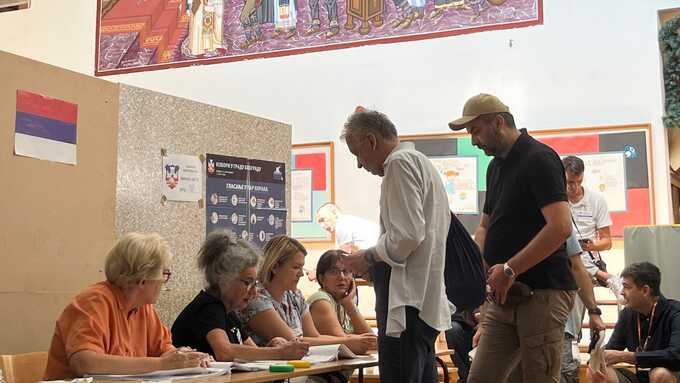In December, international observers reported that the voting process was “marred by harsh rhetoric, bias in the media, pressure on public sector employees and misuse of public resources.”
Independent media organizations and NGOs filmed busses of people allegedly being brought to Belgrade from other parts of the country and from abroad to vote for the ruling party. This prompted days-long protests that forced authorities to schedule a rerun.
During Sunday’s vote, videos surfaced again showing dozens of people sitting in makeshift call centers organized in rented sports halls, allegedly calling people on the phone to vote for SNS. Opposition activists claim the call centers had paralel voting lists.
On Tuesday, the Civic Movement Bravo from Novi Sad disclosed the contents of a mysterious backpack brought by a local citizen. It reportedly contained a “parallel voters list, voting invitations for polling station No. 163, and various notes about citizens,” including extensive personal information.
“The bag’s content includes the complete material for polling station 163—dozens of voting invitations, voter lists, as well as a list of gifts. In the notepads, you can see to whom their package is intended, along with other data,” Marija Srdić of the Bravo movement told reporters at a press conference.
Her colleague Miran Pogačar highlighted that the information in the backpack included descriptive notes about specific voters, ranging from “Does not vote for SNS” to “Impolitely closes the door,” “Refuses to vote,” “Rejects package,” “Will not vote,” “Stranger,” or “Moved away.”
Another organization from Novi Sad, the student group Stav, used social media platforms to share what they allege is evidence of election fraud and vote manipulation.
Stav shared a video allegedly showing “clear instances of electoral fraud.” The video uncovers roughly 500 individuals allegedly tied to the SNS, working in a makeshift call center, reportedly assigned to collect and manipulate votes. Stav emphasized that the entry points were guarded by masked individuals purportedly compensated by the SNS.
The student organization also unveiled two additional videos. One shows the local police protecting individuals at the suspected SNS call center, while the other captures SNS members allegedly fleeing the scene of electoral fraud with election boxes.
In a flood of press statements, SNS leaders struck back, accusing the opposition of orchestrating a deliberate campaign to disseminate false information with the goal of “portraying irregularities in the election process.”
“Every party has its call centers – they have always had them, have them now, and will have them. On the election day, our activists from there call our members and sympathizers to go out and vote. What is the problem?” asked Ana Brnabić, President of the National Assembly and vice president of the SNS main board.
While fundamental freedoms were respected and voters had a broad spectrum of political options, widespread pressure on public sector employees and the misuse of public resources cast doubt on voters’ ability to make a free choice, according to international observers.
The OSCE Office for Democratic Institutions and Human Rights (ODIHR) praised the organization of Serbia’s local elections but raised concerns about an unlevel playing field and reduced competitiveness.
“While these elections were well run, we nonetheless witnessed a dominance of the ruling party and misuse of public resources,” said Ambassador Lamberto Zannier, head of the ODIHR election observation mission.
The ODIHR highlighted that although local election administrations operated efficiently, their reliance on ruling coalition-dominated local administrations eroded public trust. Observers also flagged numerous issues with vote secrecy and reported serious irregularities, including vote buying and isolated incidents of violence.
Observers scrutinized the media landscape, noting that public service media and national private broadcasters largely favored public officials and ruling parties, while private channels often portrayed the opposition negatively. They also highlighted that media outlets prioritized national agendas over local issues, limiting the information available to voters.
The head of the observation mission, Zannier, emphasized that all political spectrum members in Serbia must now commit to progress, “not just for the benefit of one election or one party, but for the future of all citizens.”



































